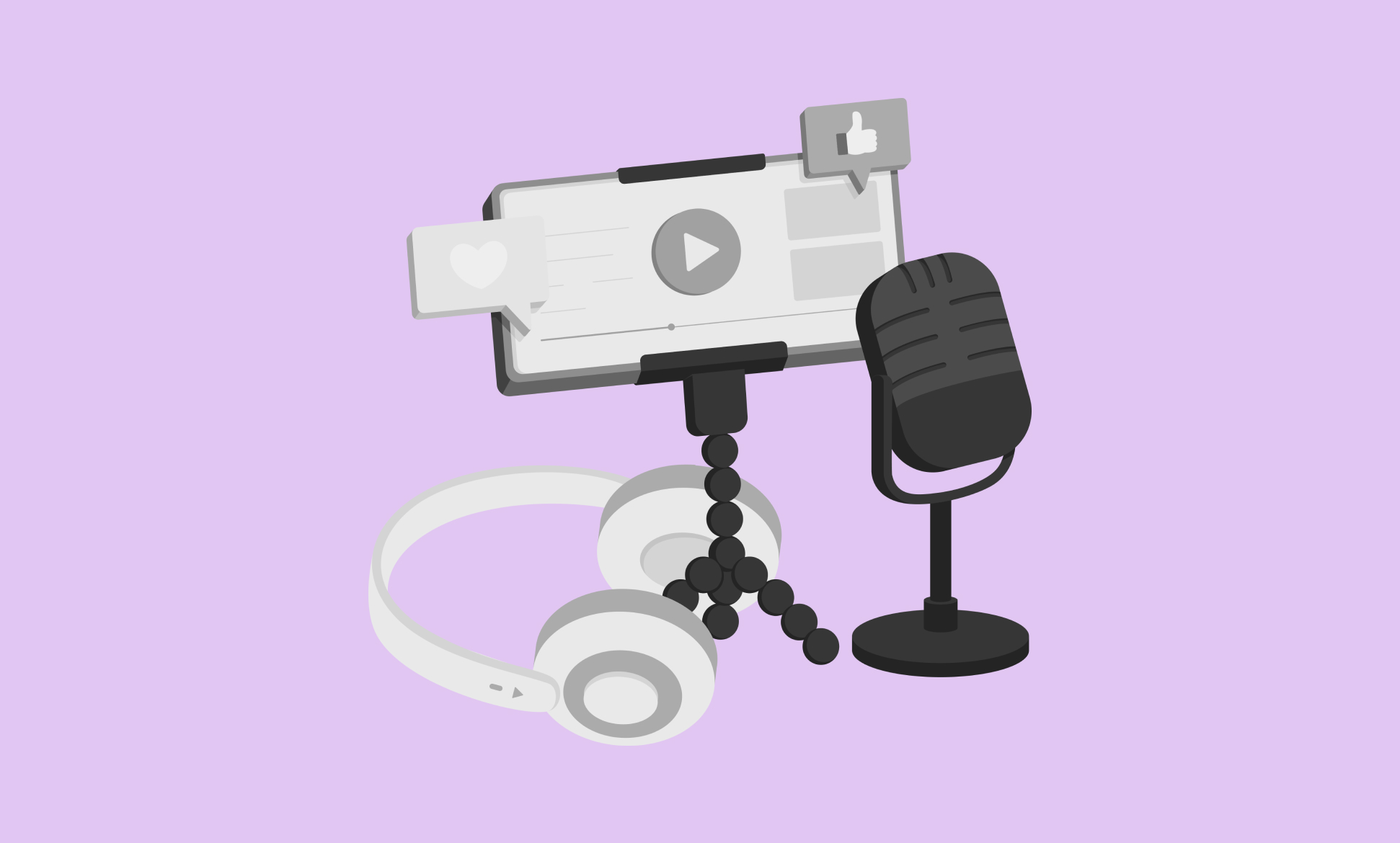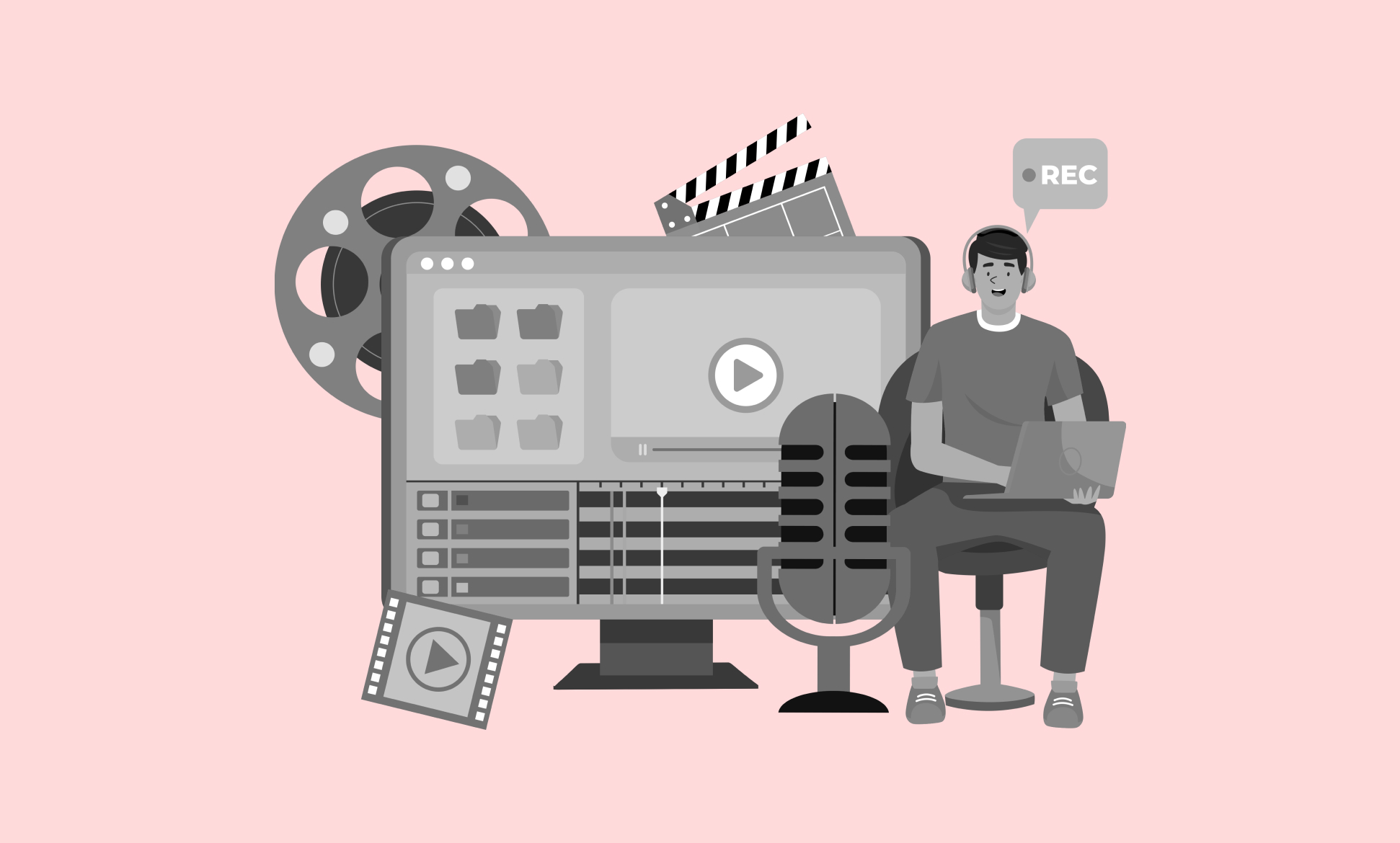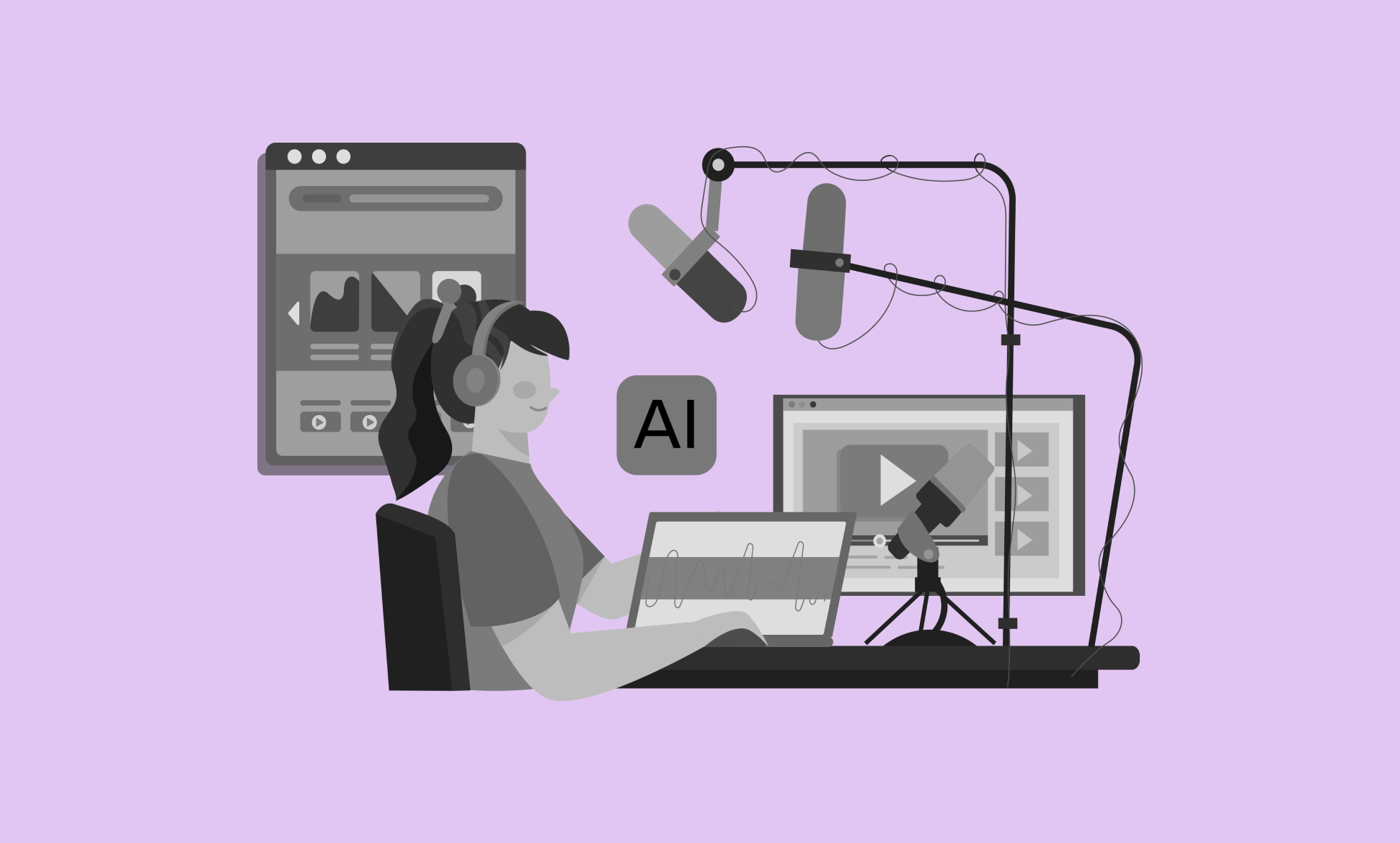Whether you’re seasons into your podcast or just starting, the equipment and tools you use for your show can make or break it.
From getting the best sound quality to easy edits and ensuring distribution across all listening apps, a great podcast setup matters.
A lot goes into creating your podcast, and unless you’ve been operating in the podcast industry for some time, it’s confusing to understand what you need and what’s well, a waste of time.
In this guide, we’ll go over the equipment and platforms you need to make your podcast workflow seamless, regardless of your budget.
Before we begin, here’s a quick breakdown of our pricing guide:
- $ = $10 or less (overall or per month)
- $$ = $11-35 (overall or per month)
- $$$ = $36-55 (overall or per month)
- $$$$ = $56+
Podcast microphones

1. Blue Yeti
Price: $$$$
A popular choice for many podcasters, the Blue Yeti is a USB microphone that’s easy to use. It’s one that our parent agency, Quill, typically recommends to clients and also has some of our own team using.
Microphone details:
- 48 kHz sample rate
- 16-bit rate
- Cardioid, Bidirectional, Omnidirectional, and Stereo polar patterns

2. Shure MV7
Price: $$$$
The Shure MV7 is a versatile dynamic microphone that features an XLR port, allowing for easy integration into an upgraded setup with an interface or mixer—no need to buy a new mic. Additionally, its design makes it an excellent choice for minimizing background noise, and ensuring clear and focused audio.
Microphone details:
- 48 kHz sample rate
- 16-bit rate
- Cardioid polar pattern

3. Rode NT-USB Microphone
Price: $$$$
The Rode NT-USB Microphone is an excellent choice if you’re ready to invest a bit more and elevate your audio quality beyond something like the Blue Yeti. This high-quality USB microphone offers superior sound clarity and precision, making it ideal for podcasters who want to achieve a more professional sound without the need for complicated equipment.
Microphone details:
- 20 Hz - 20 kHz sample rate
- 16-bit rate
- Cardioid polar pattern

4. Rode Podcaster
Price: $$$$
The Rode Podcaster is another easy-to-use USB microphone that features excellent room noise rejection which for many podcasters, is a necessity. It also has an internal shock mount to help with any accidental knocks, bumps, or keyboard sounds.
Microphone details:
- 44 - 96 kHz sample rate
- 24-bit rate
- Cardioid polar pattern
Headphones

1. Beyerdynamics DT 880
Price: $$$$
A pair of premium headphones that even Quill Podcast Agency producers swear by, the Beyerdynamic DT 880 headphones have great spatial reproduction for neutral highs and bass tones.
They’re incredibly comfy, making them an ideal choice if you’ll be recording or editing for extended hours.

2. Grados
Price: $$$$
Grados is a brand of headphones, they offer a range of options including Statement-X Series, Reference-X Series, and Prestige-X Series which are all effective for podcasting. The three different series range in price, making it more affordable to find a pair that fits within your budget.
Grados headphones are known for their natural sound which is a huge plus for any recording or editing activities.

3. audio-technica m20x
Price: $$$$
A more affordable pair of headphones compared to some mentioned above, audio-technica’s ATH M20x professional headphones have everything a podcaster would need with enhanced audio and effective isolation for editing.
These headphones are comfortable to wear for extended periods, durable, and have minimal bleed which is great during recordings.
4. Phone headphones
This is more of a last resort option but any headphones are better than no headphones for both recording and editing. So if you don’t own a professional pair of headphones, use any wire or wireless headphones you have from your phone or computer.
For guests, ensure they also use any headphones they have to ensure the best sound quality possible. More professional headphones are preferred, but we recognize this isn’t optional for some.
Podcast recording software

1. Riverside.fm
Price: $-$$
An easy-to-use but extensive remote recording software, Riverside.fm has the capabilities for podcasters at all levels.
All audio is recorded directly on each participant’s device, so you’re never at the mercy of a weak connection. Plus, Riverside offers separate track recording, video recording, live streaming, and simple editing tools to make your workflow seamless.
We love Riverside at Quill and see it as one of the most reliable recording platforms.

2. SquadCast
Price: $-$$$
Acquired by Descript, SquadCast is an excellent choice for podcasters seeking studio-quality audio with a host of features designed to elevate your recordings.
Key highlights include progressive uploads and automatic backups, ensuring your content is always secure. The platform also offers video recording, allowing one host and up to three guests to participate seamlessly. Plus, guests don’t need an account to join a session—SquadCast’s user-friendly interface makes it easy for anyone, even those new to remote recording.

3. Zencastr
Price: $$-$$$$
Covering multiple areas of your podcast workflow, Zencastr supports remote recording, hosting, editing, and other growth areas such as monetization.
The platform is geared towards podcasters but also suits anyone who has a use for audio or video recording, such as YouTubers as well. They don’t offer any free plans like the ones mentioned above, but it’s a great option for more experienced creators.

4. Alitu
Price: $$$-$$$$
A beginner-friendly software, Alitu is both a podcast hosting platform and a remote recording software. The platform is good for both solo recordings and guest recordings. It also lets you upload and store audio from any other app.
After you’ve finished a recording, you can immediately go into editing your episode through their built-in editor, similar to what the above recording platforms have as well. If you’re looking for an all-in-one platform as a beginner, this is a great option.

5. Podcastle
Price: $-$$
Podcastle is another all-in-one platform with audio recording being just one feature in their suite.
The platform is built with local recording for up to 10 participants, all on separate tracks that are uncompressed WAV audio files with 4K video. This means that no matter your internet connection, you shouldn’t run into any errors. It’s another great choice for podcasters at all levels.
Editing software

1. Descript
Price: $-$$$
Many creators don’t have a technical editing background, making the use of platforms like Pro Tools or Adobe Audition (we’ll cover below), more challenging. Using AI, Descript fulfills both your audio and video editing needs without any prior editing experience.
By just editing transcripts, Descript will see where you cut out content and automatically remove it for you. The platform also features a suite of growth features such as clips and captions.

2. Podcastle
Price: $-$$
A platform we covered above in the remote recording tools, Podcastle also features an audio and video editor.
The software allows you to slice audio files in two or more, fade in and out for seamless transitions, change the speed of your audio, and has a royalty-free library of music and sounds for you to choose from.

3. Adobe Audition
Price: $$
Many of our own editors use Adobe Audition but we will admit that it’s not beginner-friendly. If you have an interest in learning how to edit and mix episodes yourself, then this platform could be a great one to use.
But if you’re more focused on saving time or putting your energy into other areas of your podcast, then I recommend using one of the AI tools like the others covered. Audition is comprehensive with features including multitrack, waveform, and spectral display which makes it robust for creating, mixing, editing, and restoring your audio content.

4. Audacity
Price: $
For any podcasters that are starting with no budget or a very low budget, Audacity is an option for you. It’s a free podcast editor (and also recorder) that allows for multi-track editing.
It doesn’t use any AI tools like some of the other editing software, so if you’re looking to learn to edit your own content but on a budget, Audacity is a good solution for you.

5. Alitu
Price: $$$-$$$$
Another platform mentioned in the podcast recording tools is Alitu. With their drag-and-drop editor, podcasters can save editing templates, split voice clips to insert ads or music and add transitions.
They’ve also made it so nothing gets deleted and if you wish to bring back a section of the podcast you originally removed, you can do so. Alitu also has great audio clean-up features such as background noise removal and volume normalization.
Podcast hosting platforms

1. CoHost
Price: $$-$$$
Built for both brands and individual creators, CoHost is a podcast hosting platform that makes it simple to publish, manage, and grow your podcast.
The platform offers a suite of features to make your podcast process seamless such as multi-show and team management, automatic podcast websites, AI transcriptions, download tracking links, and analytics dashboards with download, unique listener, and consumption data - all at no extra cost.

2. Buzzsprout
Price: $-$$
Buzzsprout is a podcast hosting platform built for beginner to intermediate-level podcasters. It features your standard podcast analytics such as location, downloads, listening apps, and devices.
The platform also offers Magic Mastering to clean up the quality of your podcast audio, premium content and payment solutions, episode optimization, and transcriptions.

3. Ausha
Price: $$-$$$$
Ausha emphasizes podcast marketing within its hosting platform.
With features like standard hosting and distribution, monetization through DAI (dynamic ad insertion) and crowdfunding, social media publishing and scheduling, social media post analysis, podcast search, and transcriptions, the platform is a robust option for many creators.

4. Omny Studio
Price: No Pricing
A podcast hosting platform for podcasters and radio stations, Omny Studio has hosting, editing, monetization, and analytics capabilities.
The platform uniquely offers secure content distribution which allows you to release content privately to select audience members before a public launch. They also have radio features that can support live stream recordings or on-premises recording. Omny Studio is a great option for radio stations or more advanced podcasters.

5. Transistor
Price: $$-$$$$
Transistor is a podcast hosting platform with key features like private podcasts, transcriptions, website builders, and dynamic ads.
Although more standard podcast analytics that you’d find in most hosting platforms, Transistor does a great job at offering additional management features like YouTube auto-posting and team member collaboration.
Podcast analytics platforms

1. CoHost
Price: $$-$$$
Also listed among the podcast hosting platforms above, CoHost supports podcasters and brands when it comes to tracking who your audience is and if your podcast is resonating.
The podcast analytics platform offers data features like B2B Analytics, Advanced Audience Demographics, a dashboard dedicated to unique listeners, growth over time, episode comparisons, and see which marketing channels are driving the most downloads.

2. Chartable
Price: $-$$$
Acquired by Spotify, Chartable is a podcast analytics and attribution platform for publishers. The platform allows users to see the top charts on Spotify and Apple they’re ranking on in a consolidated dashboard.
Chartable users can access SmartLinks, podcast-to-podcast attribution through SmartPromos, and consolidated reviews.

3. Podder
Price: $$-$$$
Another podcast analytics platform, Podder offers chart rankings similar to Chartable above, demographic data, SmartLinks, customizable reporting, and other data-focused features.
The platform operates as a prefix, again, similar to Chartable above meaning that you don’t have any podcast hosting capabilities. For some, they prefer to keep their existing host, but for other podcasters, you might want more of an all-in-one solution such as CoHost.

4. Spotify for Podcasters
Price: Free
By the name, we assume you can gather that Spotify for Podcasters is Spotify’s podcasting solution. The platform offers insights into your podcast’s performance on Spotify and for many, that’s where the majority of their listeners tune in.
Through Spotify for Podcasters, users can manage and reply to listener comments, add polls to episodes for feedback, understand episode retention, and track how your show is growing over time.
Bonus: Podcast newsletters to follow

1. Podnews
The first one all podcasters should sign up for is Podnews. This newsletter is a daily briefing of everything happening within the podcasting industry, including relevant resources and advice.

2. The Branded Podcaster by Quill
Although geared towards brands, The Branded Podcaster by Quill Podcast Agency is still relevant for creators at all levels. The bi-weekly newsletter offers updates on brands in podcasting, industry insights and data, best practices, and much more.

3. Scrappy Podcasting by Jeremy Enns
A podcast newsletter focused on marketing, Scrappy Podcasting will be in your inbox daily offering case studies, tips, and actionable advice on how you can grow your podcast. This newsletter is relevant for small brands, individual creators, and entrepreneurs.

4. Podcasting Made Simple by Alex Sanfilippo
Gathering inspiration from the Podcasting Made Simple show, the newsletter version consolidates tips and insights from each podcast episode. Subscribe on LinkedIn to receive this weekly podcasting resource for all hosts and podcast guests.
.png)
5. The Creativity Business by Steve Pratt
Now, this newsletter isn’t just about podcasting but the ideas and inspiration you can find within The Creativity Business is relevant for all creators. Created by the Founder of Pacific Content, Steve Pratt, the newsletter explores attention strategy, differentiation, content strategy, and much more.
The best podcast equipment and setup
From recording equipment to software and growth resources, this guide to the best podcast equipment and setup is your go-to resource for ensuring you have everything you need to launch a podcast.
From here, it’s on you as a creator to ensure you stay consistent, listen to your audience, and build something worth listening to.
If you’re interested in learning more about building your podcast setup with the right tools, reach out to our team of podcast experts at CoHost!











